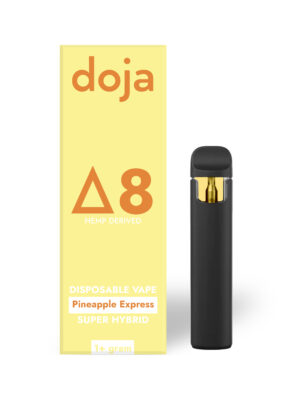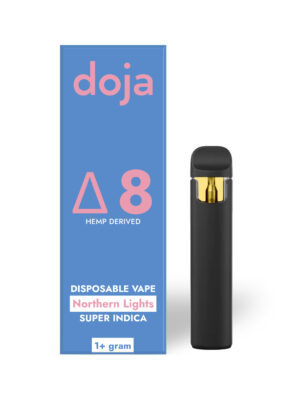Delta 8 THC is a comparatively recent cannabis product on the market.
Like any new product, the risks are unknown until more scientific research determines its characteristics. Yet, we can establish a few conclusions due to significant research on its relative delta 9 THC.
Delta-8 THC is safe, and it seems to have no negative consequences on the body. Because the high effect wears off after a few hours, your body will quickly develop a tolerance, making delta-8 less addictive.
Because delta 8 THC and delta 9 THC are so similar, they are safe when used regularly.
Contents
Delta 8 THC Is Safe
Yes, Delta-8 THC is safe. But, a high dosage of Delta-8 causes unpleasant side effects, such as drowsiness, decreased heart rate, and other indicators of being too high.
We know that delta 8 THC and delta 9 THC bind to receptors in our endocannabinoid system (ECS) in the same way. This process creates our bodies’ balance by regulating nearly every organ in the human body.
Cannabis contains cannabinoids that bind with these receptors, such as delta 8 THC, delta 9 THC, and CBD. As a result of this impact, medical professionals are looking into the medicinal effects of cannabis for various health issues.
As both cannabinoids interact with the CB1 receptor in a similar manner, delta 8 THC poses the same dangers as delta 9 THC. Therefore, these are minimal.
It’s difficult to say whether THC-8 is entirely safe for human use because there is little human research on the side effects, health impact, and tolerability. While some data suggests it is less potent than its well-known relative cannabinoid, its long-term consequences remain unknown.
As with so many other fascinating new cannabinoids, much more investigation is necessary before any scientifically valid conclusions are made.
What Are the Risks of Delta 8 THC?
There are two types of risks of Delta 8 THC: short-term risks and long-term risks.
Short Term Risks:
Delta 8 THC poses a few short-term risks. These are similar to delta 9 THC’s short-term chances. Cannabinoids have varying effects on people, and delta 8 THC can be dangerous.
The main short-term risks of Delta 8 are:
- Dry mouth
- Incoordination
- Visual distortion
- Dizziness
- Nausea
Short-term adverse risks of delta 8 THC consumption include nausea and headaches in the majority of persons. If these symptoms persist or worsen, stop using delta 8 and wait.
The danger is minor, and it is more of a nuisance than a health hazard.
Long term risks:
Delta 8 THC has few long-term dangers. However, current scientific research on the topic is limited because both cannabinoids belonged to the same family: tetrahydrocannabinol. We can conclude that delta 8 THC has similar long-term dangers as delta 9 THC.
The main long-term risks of Delta 8 THC are:
- Dependency & addiction
- Reduced attention span
- Decreased memory function
- Lowered cognitive function
- Acute psychosis
It’s worth repeating that people react differently to cannabinoids and other medications. Long-term adverse effects may occur in some persons but not in others. After a long period of inactivity, these symptoms usually fade.
Is Overdosing Delta 8 THC Possible?
Let’s start with a basic and layman definition of delta 8 THC, or at least high-quality Delta 8 items. Delta 8 is not considered a hazardous chemical to humans, like other cannabinoids found in hemp. It means that consuming an overdose of delta 8 does not put a person in danger of poisoning.
Delta-8 has just been on the market for a little over two years. However, we have yet to hear of a single, profound adverse effect that could be fatal.
What Happens When You Overdose Delta 8 THC?
These are some of the negative consequences of taking too much Delta-8 THC. Consuming too much is a regular dose for some people and not for others. Some people have low or non-existent tolerance, respectively.
Taking too little could also be dangerous, mainly because it is such a shock to the body. People become anxious the first few times since the impacts are far more potent than they anticipated. Few common effects of an overdose of Delta 8 THC are:
- Anxiety, paranoia, and a general feeling of unease
- Lower blood pressure for a short time,
- A higher heart rate.
- Dry eyes
- Dry mouth
- Dizziness
Are Impure Delta 8 THC Products Dangerous?
Contamination is the source of the most significant risk linked with delta 8 THC products. You may be at risk from some of the additional components and chemicals included in the extract rather than the delta 8 THC itself. Synthetic chemicals, heavy metals, and solvent residues are all dangerous to the human body.
It’s also crucial to look at third-party lab reports before purchasing and consuming any product. These results will be readily shown on any respected company’s website.
Does Delta 8 develop tolerance?
Delta 8 THC, like delta 9 THC, develops tolerance with time. So, you’ll need to raise your dosage as the effects fade gradually. As a result of this, you may go beyond your consumption to achieve the “high” you desire.
You’ll get the most from D8 THC if you keep your tolerance under control. Having a low tolerance can help you prevent addiction and save money by reducing your usage.
How To Avoid Delta 8 THC Tolerance?
Avoiding a delta 8 THC tolerance is easy, and it works in the same way that managing a delta 9 THC tolerance does: by taking “tolerance breaks.”
The length of time you should go without Delta-8 to lessen your tolerance depends on various factors, including the amount of Delta-8-THC you consume regularly and your particular metabolism.
As a basic guideline, the more THC you’ve taken in the past, the more your CB1 receptor system has been suppressed. Sadly, there isn’t much research to help us figure out how long it takes the body to adjust the CB1 receptor level after you stop using THC.
A tolerance break can last anything from a few days to a month. People usually need to refrain for two to four weeks or more if they were previously using moderate to heavy dosages of Delta-8-THC daily.
Several days could be enough to assist reset the equilibrium for those who use tiny, occasional doses of Delta-8-THC.
Conclusion:
Delta 8 THC is safe to use. However, a few potential risks exist, just like any other drug.
More scientific research is required to detail the potential long-term risks of delta 8 THC. Apart from that, delta 8 THC, like most cannabinoids, appears to offer no immediate health risks.
If you’re considering experimenting with delta 8 THC, proceed with caution. Although adverse responses to cannabinoids are uncommon, everyone reacts differently to them. To ensure your body receives the chemical, start with a modest dose and gradually increase it.
Before using delta 8 THC, it would be helpful to research the topic. To locate the right product for you, research the firm and its derivatives, dosage alternatives, overdose precautions, and third-party lab reports.




